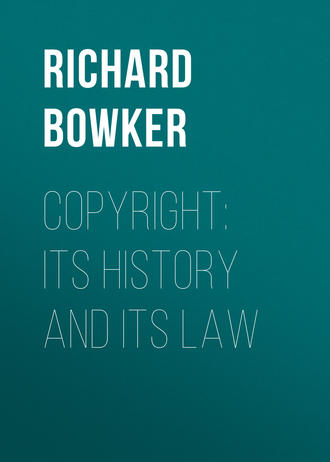 полная версия
полная версияCopyright: Its History and Its Law

Copyright: Its History and Its Law
FOREWORD
Copyright progress
The American copyright code of 1909, comprehensively replacing all previous laws, a gratifying advance in legislation despite its serious restrictions and minor defects, places American copyright practice on a new basis. The new British code, brought before Parliament in 1910, and finally adopted in December, 1911, to be effective July 1, 1912, marks a like forward step for the British Empire, enabling the mother country and its colonies to participate in the Berlin convention. Among the self-governing Dominions made free to accept the British code or legislate independently, Australia had already adopted in 1905 a complete new code, and Canada is following its example in the measure proposed in 1911, which will probably be conformed to the new British code for passage in 1912. Portugal has already in 1911 joined the family of nations by adherence to the Berlin convention, Russia has shaped and Holland is shaping domestic legislation to the same end, and even China in 1910 decreed copyright protection throughout its vast empire of ancient and reviving letters. The Berlin convention of 1908 strengthened and broadened the bond of the International Copyright Union, and the Buenos Aires convention of 1910, which the United States has already ratified, made a new basis for copyright protection throughout the Pan American Union, both freeing authors from formalities beyond those required in the country of origin. Thus the American dream of 1838 of "a universal republic of letters whose foundation shall be one just law" is well on the way toward realization.
Field for the present treatise
In this new stage of copyright development, a comprehensive work on copyright seemed desirable, especially with reference to the new American code. Neither Eaton S. Drone nor George Haven Putnam were disposed to enter upon the task, which has therefore fallen to the present writer. He hopes that his participation for the last twenty-five years in copyright development, – during which, as editor of the Publishers' Weekly and of the Library Journal, he has had occasion to keep watch of copyright progress, and as vice-president of the American (Authors) Copyright League, he has taken part in the copyright conferences and hearings and in the drafting of the new code, – will serve to make the present volume of use to his fellow members of the Authors Club and to like craftsmen, as well as to publishers and others, and aid in clarifying relations and preventing the waste and cost of litigation among the coördinating factors in the making of books and other forms of intellectual property.
Authorities and acknowledgments
The present work includes some of the historical material of the Bowker-Solberg volume of 1886, "Copyright, its law and its literature." This material has been verified, extended and brought up to date, especially in the somewhat detailed sketch of the copyright discussions and legislation resulting in the "international copyright amendment" of 1891 and the code of 1909. The volume is in this respect practically, and in other respects entirely new. It has had the advantage of the cordial co-operation of the copyright authorities at Washington, especially the Librarian of Congress, Herbert Putnam, and the Register of Copyrights, Thorvald Solberg; also of helpful courtesy from the Canadian Minister of Agriculture in the recent Laurier administration, Sidney Fisher, and the Canadian Registrar of Copyrights, P. E. Ritchie, and of Prof. Ernest Röthlisberger, editor of the Droit d'Auteur, and one of the best authorities on international copyright. This acknowledgment of obligation is not to be taken as assuming for the work official sanction and authority, though so far as practicable, it reflects the opinions of the best authorities. The writer has also consulted freely – but it is hoped always within the limits of "fair use" – the best law book writers, especially Drone, Copinger, Colles and Hardy, and MacGillivray, to whom acknowledgment is made in the several chapters. Acknowledgment is also made for the courtesies of Sir Frederick Macmillan, G. Herbert Thring, secretary of the British Society of Authors, and others numerous beyond naming. But most of all the writer is indebted to the intelligent and capable helpfulness of Carl L. Jellinghaus, who as private secretary, has been both right hand and eyes to the writer, and besides participating in the work of research, is largely responsible for the index and other "equipment" of the volume.
Method and form
Copyright law is exceptionally confused and confusing, and even the new American and British codes are not without such defects. Specific subjects are so interdependent that it has been difficult to make clear lines of division among the several chapters, and there is necessarily repetition; it has been the endeavor to concentrate the main discussion in one place, designated in the index by black face figures, with subordinate references in other chapters. Ambiguities in the text of this volume often reflect ambiguities in the laws, particularly of foreign countries. Where acts, decisions, etc., are quoted in the text or given in the appendix, spelling, capitalization, punctuation, headings, etc., follow usually the respective forms, thus involving apparent inconsistencies. Side-headings in the appendix follow usually the official form, unless shortened to prevent displacement. Translations of foreign conventions follow usually the official text of the translation, but have been corrected or conformed in case of evident error or variance. Citation of cases is confined for the most part to ruling or recent cases or those of historic importance or interest. Though it has not been practicable to verify statements from the copyright laws of so many countries in divers languages, a fairly comprehensive and accurate statement of the status of copyright throughout the world is here presented. The present work, originally planned for publication in 1910, has been held back and alterations and insertions made to bring the record of legislation to the close of 1911. For those who wish to keep their copyright knowledge up to date, the Publishers' Weekly will endeavor to present information as to the English speaking world, and the monthly issues of the Droit d'Auteur of Berne, under the editorship of Prof. Röthlisberger, will be found a comprehensive and adequate guide.
Advocates of authors' rights
The preparation of this work brings a recurring sense of the losses which the copyright cause has suffered during the long campaign for copyright reform, beginning in the American Copyright League, under the presidency of James Russell Lowell, and continued under that of Edmund Clarence Stedman, both of whom have passed over to the majority. Bronson Howard, always active in the counsels of the League as a vice-president, and the foremost advocate of dramatic copyright as president of the American Dramatists Club, failed, like Stedman, to see the fulfillment of his labors in the passage of the act of 1909. George Parsons Lathrop, Edward Eggleston, Richard Watson Gilder, "Mark Twain" and other ardent advocates of the rights of the author, gave large share of enthusiasm and effort to the cause. Happily the two men who for the last twenty years and more have labored at the working oar for the Authors League and for the Publishers League, are still active in the good work, ready to defend the code against attack and eager to forward every betterment that can be made; to Robert Underwood Johnson, the successor of the lamented Gilder as editor of the Century, and to George Haven Putnam, the head of the firm which still bears the name of his honored father, authors the world over owe in great measure the progress which has been made in America toward a higher ideal for the protection of authors' rights.
Copyright evolution
It may be noted that while throughout the British Empire English precedent is naturally followed, the more restrictive American copyright system has unfortunately influenced legislation in Canada and Newfoundland, and in Australia. France, open-handed to authors of other countries, has afforded precedent for the widest international protection and for the international term; while Spain, with the longest term and most liberal arrangements otherwise, has been followed largely by Latin American countries. The International Copyright Union has reached in the Berlin convention almost the ideal of copyright legislation, and this has been closely followed in the Buenos Aires convention of the Pan American Union. The world over, there seems to have been a general evolution of copyright protection from the rude and imperfect recognition of intellectual property as cognate to other property, for a term indefinite and in a sense perpetual, almost impossible of enforcement in the lack of statutory protection and penalties. Systems of legislation, at first of very limited term and of restricted scope, have led up to the comprehensive codes giving wide and definite protection for all classes of intellectual property for a term of years extending beyond life, with the least possible formalities compatible with the necessities of legal procedure. Unfortunately in the United States of America the forward movement which produced the "international copyright amendment" of 1891 and the code of 1909, conspicuously excellent despite defects of detail, was in some measure offset by retrogression, as in the manufacturing restrictions. Until this policy, which still remains a blot on the 'scutcheon, is abandoned, as the friends of copyright hope may ultimately be the case, the United States of America cannot enter on even terms the family of nations and become part of the United States of the world.
R. R. Bowker.December, 1911.
Postscript. Since this book has been passing through the press, Cuba has been added to the countries in reciprocal relations with the United States with respect to mechanical music by the President's proclamation of November 27, 1911; Russia has made with France its first copyright treaty, in conformity with the new Russian code of 1911; and the new British code, referred to on p. 33, having passed the House of Commons August 17, passed the House of Lords December 6, and after concurrence by the House of Commons in minor amendments, mostly verbal, became law by Crown approval, December 16, 1911, as noted on p. 374. The text of the act in the appendix follows the official text as it now stands on the English statute books; the summary (pp. 374-80) describes the act as it became law – and the earlier references are in accordance therewith, with a few exceptions. These exceptions mostly concern immaterial changes, made in the House of Lords. Within January, 1912, Brazil has adopted a new measure for international copyright, and a treaty has been signed between the United States and Hungary, the twenty-fifth nation in reciprocal relations with this country.
CONSPECTUS OF COPYRIGHT BY COUNTRIES
Under the names of countries are given dates of the basic and latest amendatory laws. International relations are shown by the name in small caps of the convention city when a country is a party to the International Copyright Union or the Pan American conventions, and by the names of countries with which there are specific treaties, excepting those within the union or conventions. The general term of duration is entered, without specification of special terms for specific classes. Places of registration and deposit are indicated by R and D when these are not the same. The number of copies required and in some cases period after publication within which deposit is required are given in parentheses. Notice of copyright or of reservation is indicated. Special exceptions or conditions are noted so far as practicable under remarks. An asterisk indicates that specific exceptions exist.
The International Copyright Union includes (A) under the Berlin convention, 1908 (a) without reservation Germany, Belgium, Luxemburg, Switzerland, Spain, Monaco, Liberia, Haiti, Portugal, and (b) with reservation France, Norway, Tunis, Japan; (B) under the Berne convention, 1886, and the Paris additional act and interpretative declaration, 1896, Denmark, Italy; (C) under the Berne convention, 1886, and the Paris additional act, 1896, Great Britain; (D) under the Berne convention, 1886, and the Paris interpretative declaration, 1896, Sweden. The Pan American conventions agreed on at Mexico City, 1902, Rio de Janeiro, 1906, and Buenos Aires, 1910, have not been ratified except that of Mexico by the United States and by Costa Rica, Guatemala, Honduras, Nicaragua, Salvador, and doubtfully by Cuba and Dominican Republic; that of Rio by a few states insufficient to make it anywhere operative; and that of Buenos Aires by the United States. The South American convention of Montevideo, 1889, has been accepted by Argentina, Paraguay and Uruguay, Peru and Bolivia, and has the adherence (in relation with Argentina and Paraguay only) of Belgium, France, Italy and Spain. The five Central American states have a mutual convention through their Washington treaty of peace of 1907.
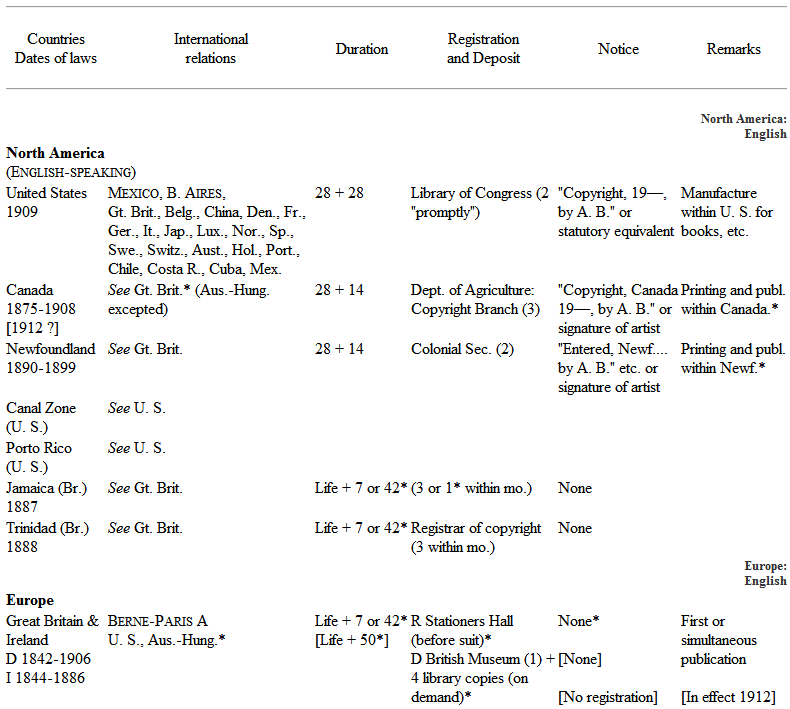
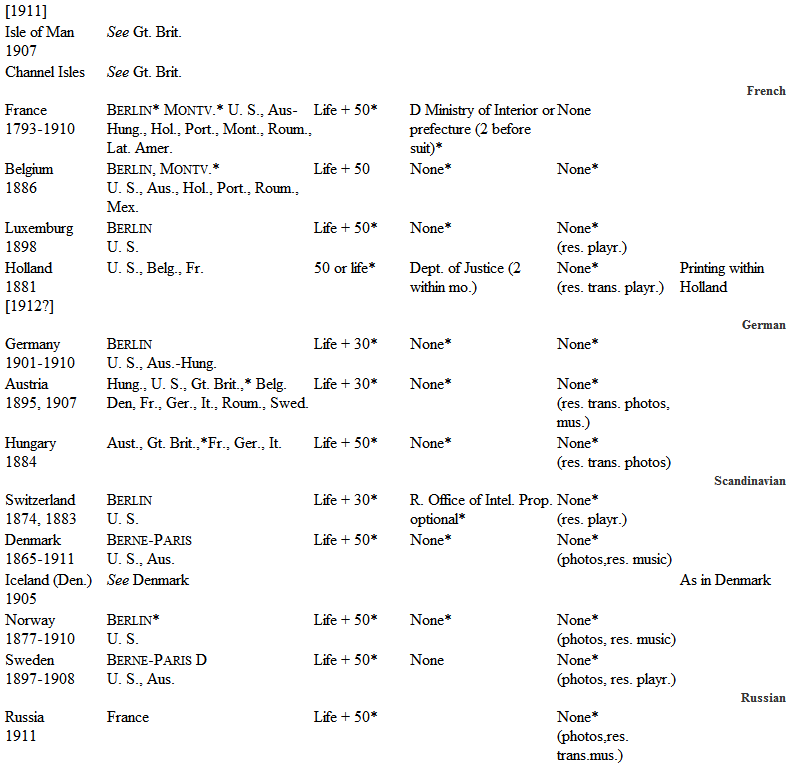
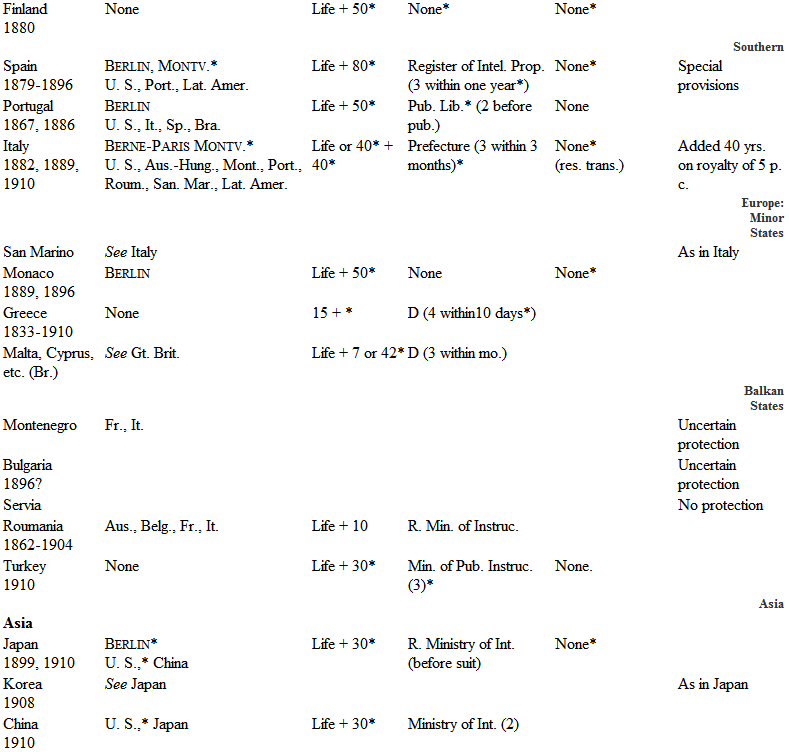
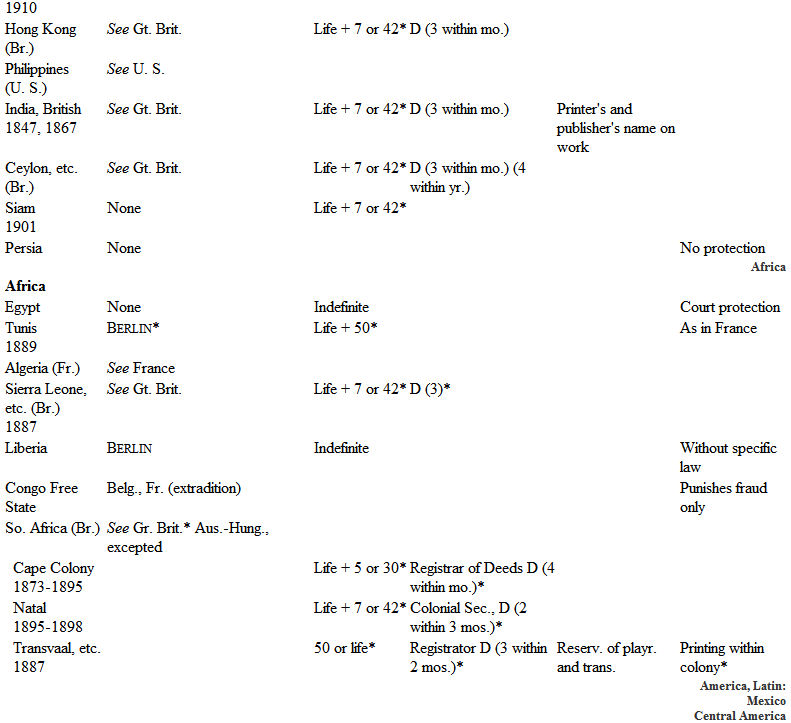
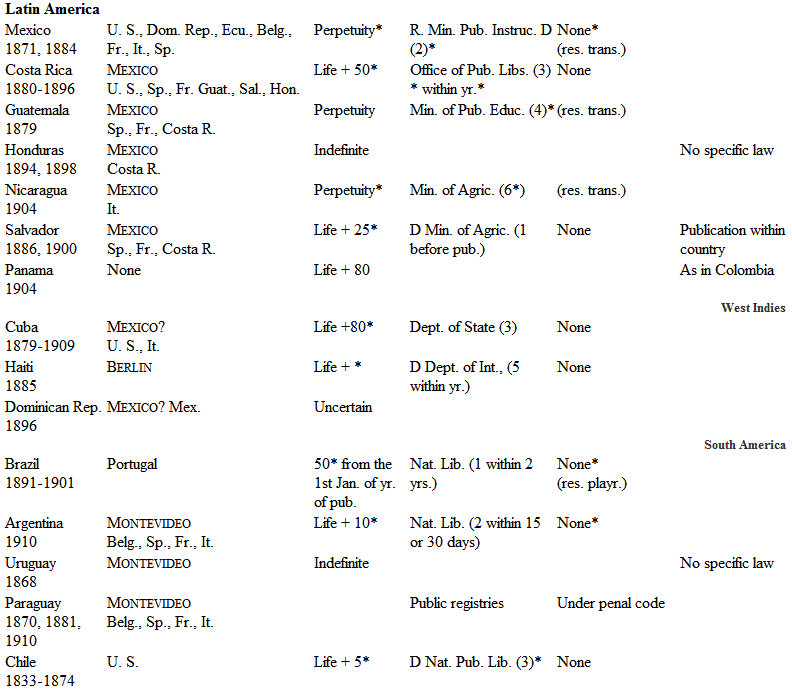
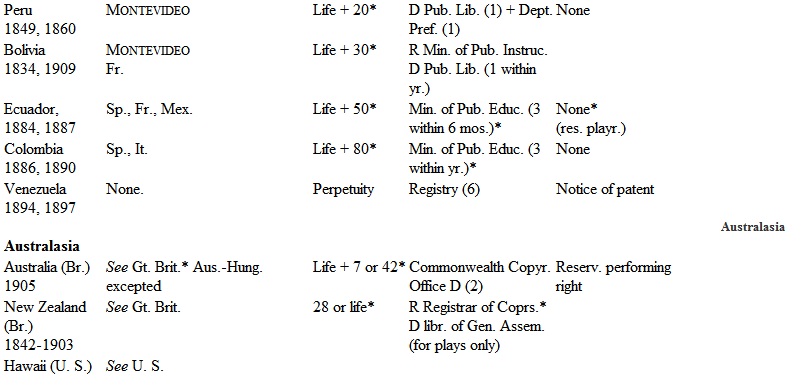
COPYRIGHT
ITS HISTORY AND ITS LAW
I
THE NATURE AND ORIGIN OF COPYRIGHT
Copyright, meaning
Copyright (from the Latin copia, plenty) means, in general, the right to copy, to make plenty. In its specific application it means the right to multiply copies of those products of the human brain known as literature and art.
There is another legal sense of the word "copyright" much emphasized by several English justices. Through the low Latin use of the word copia, our word "copy" has a secondary and reversed meaning, as the pattern to be copied or made plenty, in which sense the schoolboy copies from the "copy" set in his copy-book, and the modern printer calls for the author's "copy."
Its two senses
Copyright, accordingly, may also mean the right in copy made (whether the original work or a duplication of it), as well as the right to make copies, which by no means goes with the work or any duplicate of it. Said Lord St. Leonards in the case of Jefferys v. Boosey in 1854: "When we are talking of the right of an author we must distinguish between the mere right to his manuscript, and to any copy which he may choose to make of it, as his property, just like any other personal chattel, and the right to multiply copies to the exclusion of every other person. Nothing can be more distinct than these two things. The common law does give a man who has composed a work a right to that composition, just as he has a right to any other part of his personal property; but the question of the right of excluding all the world from copying, and of himself claiming the exclusive right of forever copying his own composition after he has published it to the world, is a totally different thing." Baron Parke, in the same case, pointed out expressly these two different legal senses of the word copyright, the right in copy, a right of possession, always fully protected by the common law, and the right to copy, a right of multiplication, which alone has been the subject of special statutory protection.
Blackstone
Blackstone in his Commentaries of 1767, in which the word copyright seems to have been first used, lays down the fundamental principles of copyright as follows: "When a man, by the exertion of his rational powers, has produced an original work, he seems to have clearly a right to dispose of that identical work as he pleases, and any attempt to vary the disposition he has made of it appears to be an invasion of that right. Now the identity of a literary composition consists entirely in the sentiment and the language; the same conceptions, clothed in the same words, must necessarily be the same composition; and whatever method be taken of exhibiting that composition to the ear or the eye of another, by recital, by writing, or by printing, in any number of copies, or at any period of time, it is always the identical work of the author which is so exhibited; and no other man (it hath been thought) can have a right to exhibit it, especially for profit, without the author's consent. This consent may, perhaps, be tacitly given to all mankind, when an author suffers his work to be published by another hand, without any claim or reserve of right, and without stamping on it any marks of ownership; it being then a present to the public, like building a church or bridge, or laying out a new highway."
Property by creation
There is nothing which may more rightfully be called property than the creation of the individual brain. For property (from the Latin proprius, own) means a man's very own, and there is nothing more his own than the thought, created, made out of no material thing (unless the nerve-food which the brain consumes in the act of thinking be so counted), which uses material things only for its record or manifestation. The best proof of own-ership is that if this individual man or woman had not thought this individual thought, realized in writing or in music or in marble, it would not exist. Or if the individual thinking it had put it aside without such record, it would not, in any practical sense, exist. We cannot know what "might have beens" of untold value have been lost to the world where thinkers, such as inventors, have had no inducement or opportunity thus to materialize their thoughts.
Are thoughts created?
It is sometimes said, as a bar to this idea of property, that no thought is new – that every thinker is dependent upon the gifts of nature and the thoughts of other thinkers before him, as every tiller of the soil is dependent upon the land as given by nature and improved by the men who have toiled and tilled before him, – a view of which Henry C. Carey has been the chief exponent in this country. But there is no real analogy – aside from the question whether the denial of individual property in land would not be setting back the hands of progress. If Farmer Jones does not raise potatoes from a piece of land, Farmer Smith can; but Shakespeare cannot write "Paradise lost" nor Milton "Much ado," though before both Dante dreamed and Boccaccio told his tales. It was because of Milton and Shakespeare writing, not because of Dante and Boccaccio who had written, that these immortal works are treasures of the English tongue. It was the very self of each, in propria persona, that gave these form and worth, though they used words that had come down from generations as the common heritage of English-speaking men. Property in a stream of water, as has been pointed out, is not in the atoms of the water but in the flow of the stream.
Property in unpublished works
Property right in unpublished works has never been effectively questioned – a fact which in itself confirms the view that intellectual property is a natural inherent right. The author has "supreme control" over an unpublished work, and his manuscript cannot be utilized by creditors as assets without his consent. "If he lends a copy to another," says Baron Parke, "his right is not gone; if he sends it to another under an implied undertaking that he is not to part with it or publish it, he has a right to enforce that undertaking." The receiver of a letter, to whom the paper containing the writing has undoubtedly been given, has no right to publish or otherwise use the letter without the writer's consent. The theory that by permitting copies to be made, an author dedicates his writing to the public, as an owner of land dedicates a road to the public by permitting public use of it for twenty-one years, overlooks the fact that in so doing the author only conveys to each holder of his book the right to individual use, and not the right to multiply copies, as though the landowner should not give but sell permission to individuals to pass over his road, without any permission to them to sell tickets for the same privilege to other people. The owner of a right does not forfeit a right by selling a privilege.
The question of publication
It is at the moment of publication that the undisputed possessory right passes over into the much disputed right to multiply copies, and that the vexed question of the true theory of copyright property arises. The broad view of literary property holds that the one kind of copyright is involved in the other. The right to have is the right to use. An author cannot use – that is, get beneficial results from – his work, without offering copies for sale. He would be otherwise like the owner of a loaf of bread who was told that the bread was his until he wanted to eat it. That sale would seem to contain "an implied undertaking" that the buyer has liberty to use his copy, but not to multiply it. Peculiarly in this kind of property the right of ownership consists in the right to prevent use of one's property by others without the owner's consent. The right of exclusion seems to be indeed a part of ownership. In the case of land the owner is entitled to prevent trespass, to the extent of a shot-gun, and in the same way the law recognizes the right to use violence, even to the extreme, in preventing others from possession of one's own property of any kind. The owner of a literary property has, however, no physical means of defence or redress; the very act of publication by which he gets a market for his productions opens him to the danger of wider multiplication and publication without his consent. There is, therefore, no kind of property which is so dependent on the help of the law for the protection of the real owner.
Inherent right
The inherent right of authors is a right at what is called common law – that is, natural or customary law. The common law, says Kent, "includes those principles, usages, and rules of action applicable to the government and security of person and property which do not rest for their authority upon any express and positive declaration of the will of the legislature." "The common law or lex non scripta," says Blackstone, "depends upon its having been used time out of mind; or, in the solemnity of our legal phrase, time whereof the memory of man runneth not to the contrary." So far as concerns the undisputed rights before publication, the copyright laws are auxiliary merely to common law. Rights exist before remedies; remedies are merely invented to enforce rights. "The seeking for the law of the right of property in the law of procedure relating to the remedies," says Copinger in his standard English work on "The law of copyright," "is a mistake similar to supposing that the mark on the ear of an animal is the cause, instead of the consequence, of property therein."
Statutory penalties
After the invention of printing it became evident that new methods of procedure must be devised to enforce common law rights. Copyright became, therefore, the subject of statute law, by the passage of laws imposing penalties for a theft which, without such laws, could not be punished.
Statute of Anne
Supersedure of common law right
These laws, covering naturally only the country of the author, and specifying a time during which the penalties could be enforced, and providing means of registration by which authors could register their property rights, as the title to a house is registered when it is sold, had an unexpected result. The statute of Anne, which is the foundation of present English copyright law, intended to protect authors' rights by providing penalties against their violation, had the effect of limiting those rights. It was doubtless the intention of those who framed the statute of Anne to establish, for the benefit of authors, specific means of redress. Overlooking apparently the fact that law and equity, as their principles were then established, enabled authors to use the same means of redress, so far as they held good, which persons suffering wrongs as to other property had, the law was so drawn that in 1774 the English House of Lords (against, however, the weight of one half of English judicial opinion) decided that, instead of giving additional sanction to a formerly existing right, the statute of Anne had substituted a new and lesser right to the exclusion of what the majority of English judges held to have been an old and greater right. Literary and like property to this extent lost the character of copy-right, and became the subject of copy-privilege, depending on legal enactment for the security of the private owner. American courts, wont to follow English precedent, have rather taken for granted this view of the law of literary property, and our Constitution, in authorizing Congress to secure "for limited times to authors and inventors the exclusive right to their respective writings and discoveries," was evidently drawn from the same point of view, though it does not in itself deny or withdraw the natural rights of the author at common law.

